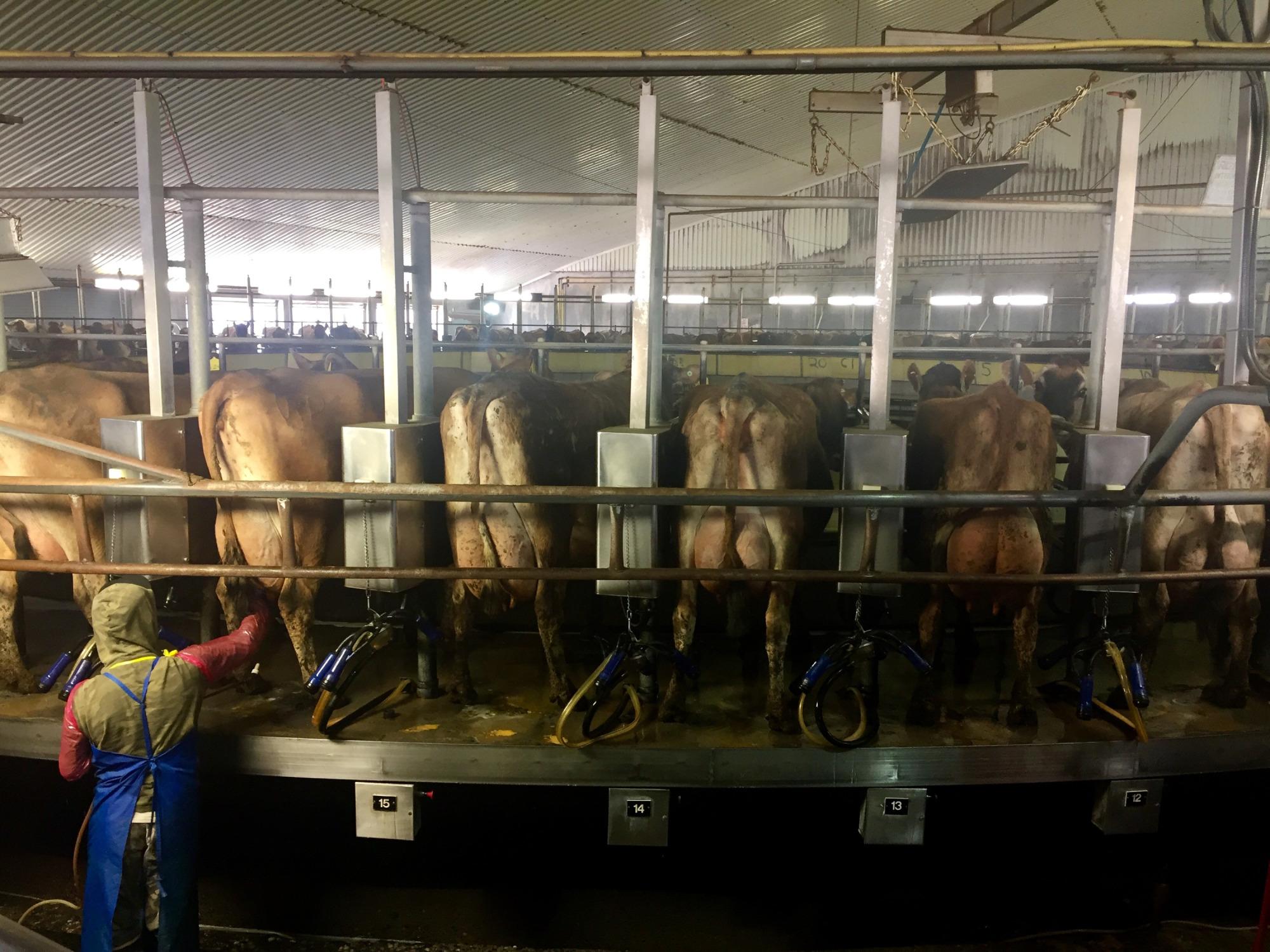
In this OPB file photo, dairy cows have their milk pumped at Threemile Canyon Farms in Boardman, Oregon.
Courtney Flatt
A complaint filed this week accuses Oregon’s largest dairy of violating state air pollution rules while seeking credit for reducing greenhouse gas emissions in California.
The environmental advocacy nonprofit Food and Water Watch argues Threemile Canyon Farms, on the outskirts of Boardman, falsely claimed to be following all environmental regulations when it applied to bank and sell credits in California’s low-carbon fuel standard program.
“We now know that it wasn’t true at the time,” said Tyler Lobdell, a staff attorney with Food and Water Watch. “And so we consider that either an incomplete or an inaccurate report to the agency.”
Food and Water Watch is asking the California Air Resources Board to invalidate Threemile’s credits and cancel the dairy’s account.
The complaint references five violations of the air quality permit that allows Threemile to operate methane digesters that the dairy uses to capture methane from liquefied cow manure. The Oregon Department of Environmental Quality fined Threemile $19,500 for exceeding its maximum allowed particulate matter pollution at the facility five times between June 2019 and September 2020.
The violations stemmed from Threemile overusing a natural gas burner at the digester facility to dry manure so it could be reused as animal bedding. A spokesperson for the dairy, Jennifer Maleitzke, said in an email that Threemile took immediate action to reduce its natural gas usage, paid the fine and has since been in compliance with its air quality permit.
Maleitzke added that Threemile is proud to contribute to California’s greenhouse gas reduction goals through the low-carbon fuel standard.
“The path of innovation isn’t perfect but it is necessary if we are to continue to meet the nutritional needs of our population as well as ensure the long-term sustainability of our planet,” she said.
California’s low-carbon fuel standard is a market-based program designed to encourage the use and production of less carbon-intensive fuels. The transportation sector is California’s largest source of greenhouse gas emissions.
The program sets a cap on the carbon intensity of gasoline, diesel and other transportation fuels that declines over time. To meet the cap, businesses or other entities in the program need to reduce their own transportation-related emissions.
Companies like Threemile can generate credits by producing fuels that are less carbon-intensive than traditional fossil fuels like gasoline or diesel. By capturing methane from cow manure, dairy farms arguably reduce the amount of heat-trapping methane that is emitted into the atmosphere.
Under California’s program, Threemile can sell its credits to heavier polluters to offset their emissions and stay under the state’s limit.
Threemile Canyon Farms applied to generate credits after completion of its methane digester facility in 2019. The biomethane produced in Boardman is piped to California for use as alternative, low-carbon fuel.
The California Air Resources Board approved the dairy’s application in September 2020, allowing it to begin banking credits.
Lobdell said Threemile’s application was made under false pretenses.
“A facility that can’t even be forthcoming in their application process, we don’t believe should be given the trust that’s involved in being an approved entity under the [low-carbon fuel standard] going forward,” Lobdell said.
A spokesperson for the California Air Resources Board said in an email that the agency will investigate the claims made in Food and Water Watch’s complaint.
The agency this week responded to a broader petition from Food and Water Watch and other groups that seeks to exclude fuels derived from dairy or swine manure from the low-carbon fuel program. The groups argue the credits incentivize too much additional pollution in and around farms. The agency says it will will take up the issue in 2023.



